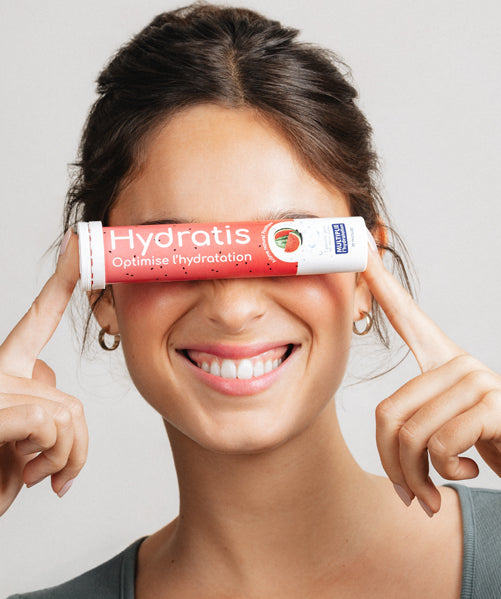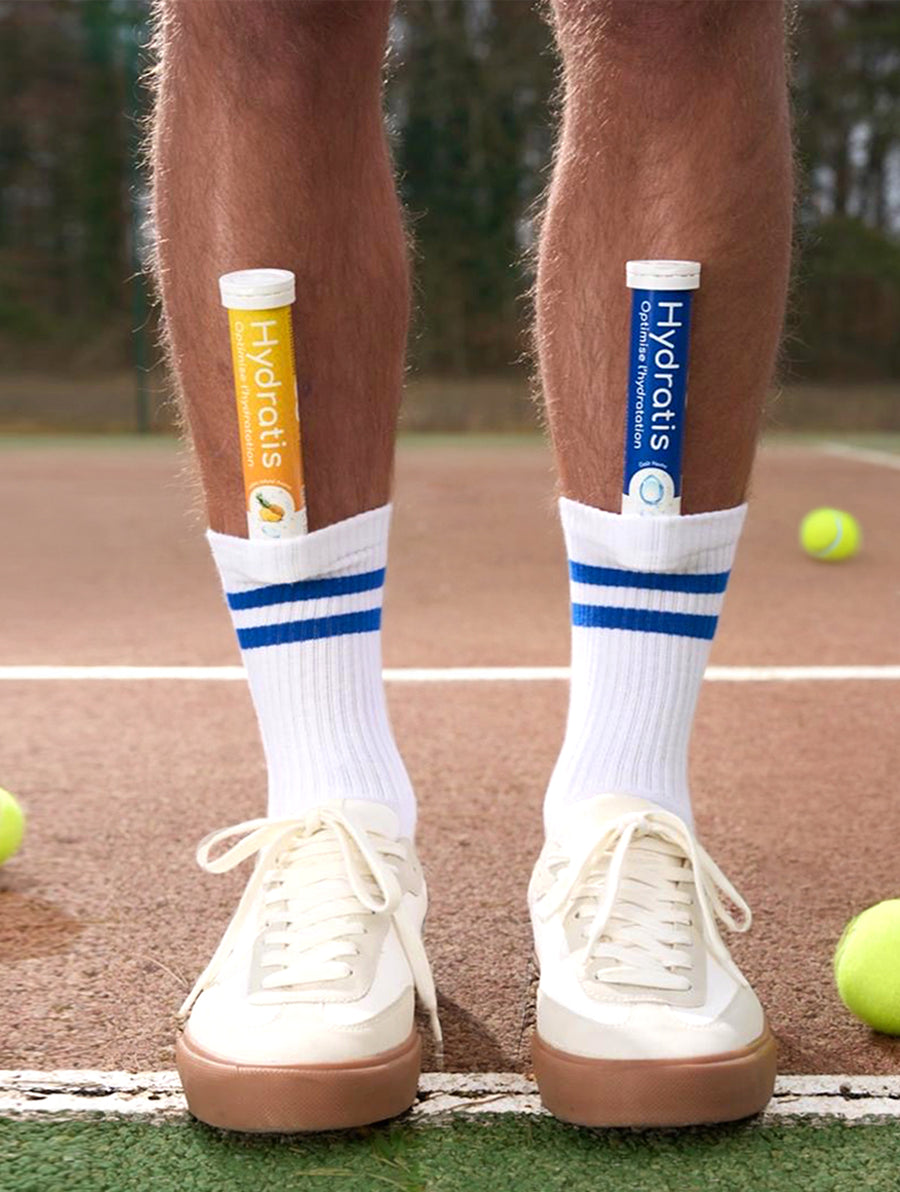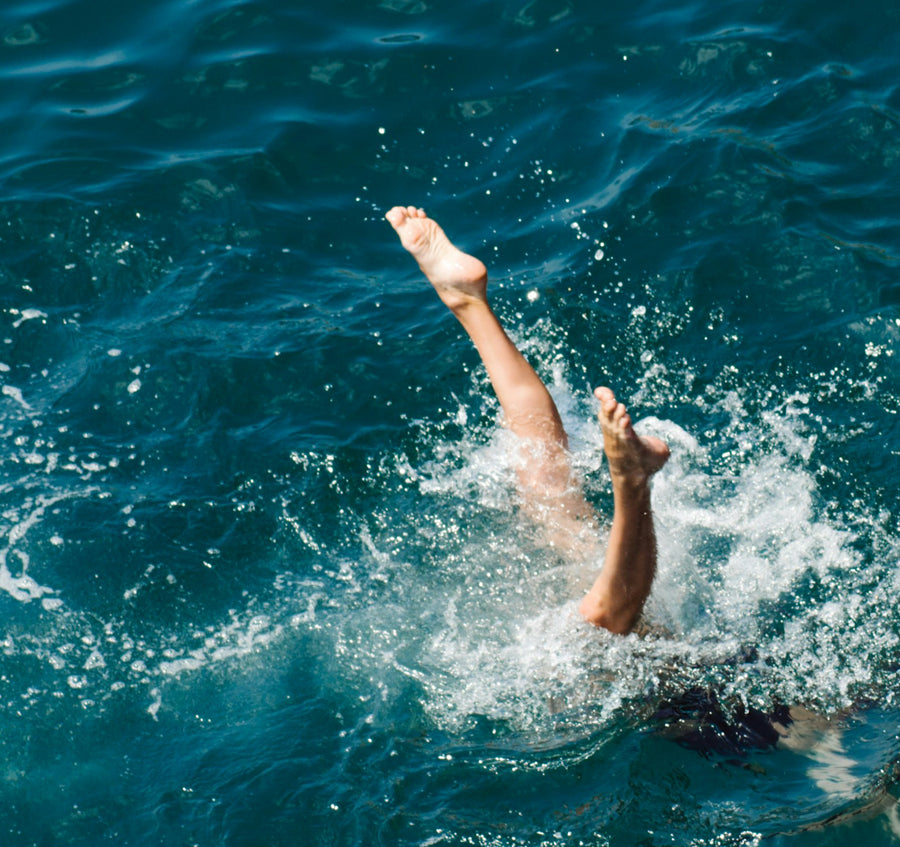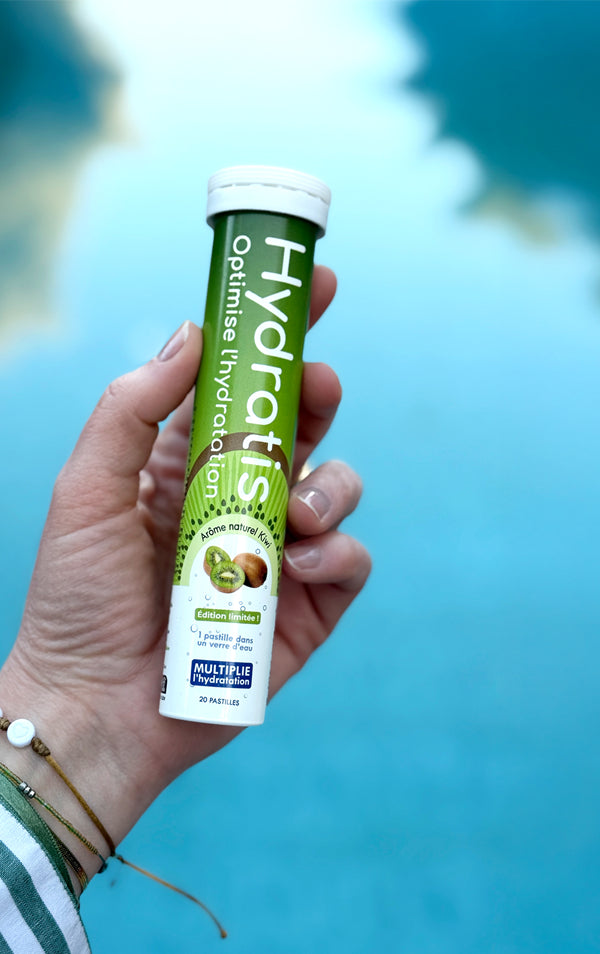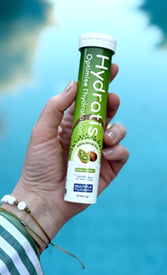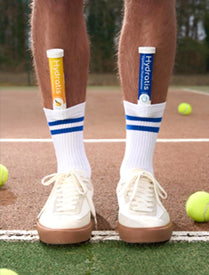In hot weather, after exertion, or when you're feeling tired, water rich in sodium can be your best ally for hydrating your body . It helps replenish lost electrolytes , especially when you sweat a lot. But be careful: in nutrition, everything is a matter of context and moderation. In this article, we'll discuss the benefits and risks of sodium-rich water , the situations in which you can consume it—and those in which you should avoid it—as well as the best brands to suit your needs.
Sodium: role, sources and needs
What is sodium?
Sodium is an electrolyte , meaning it's an essential mineral found in the blood and extracellular fluids. Like potassium , calcium , and magnesium , it's vital for the body to function properly. Present in small amounts in tap water , it's found primarily in many foods and beverages.
Where can sodium be found?
It comes primarily from food . Table salt is the main source . It is therefore found in salted , processed, dried and smoked foods such as cured meats, cheeses, breads, sauces, prepared dishes, soups or industrial broths … Some natural mineral waters and sports drinks also contain it, as do oral rehydration solutions (ORS) .
What are the benefits of sodium?
This mineral helps the body maintain proper hydration . It works synergistically with calcium and magnesium to support muscle contraction and bone health. As a micronutrient, it is also involved in several vital functions. For your body: regulation of blood pressure , transmission of nerve impulses and transport of certain nutrients across cell membranes.
What are the effects of a sodium deficiency?
Excess salt is harmful, but a deficiency ( hyponatremia ) can also be problematic. When this occurs, you may experience fatigue , headaches , cramps, or confusion . In athletes or during hot weather, excessive loss of water and sodium can lead to significant dehydration .
What type of water should I drink to avoid a sodium deficiency?
If you have a deficiency, opt for a bottle of sodium-rich mineral water, still or sparkling . It provides a stable mineral intake, unlike sources that are too salty, such as commercially produced broths, or too high in calories, such as sodas. We will present the mineral-rich waters later in this article.
Is the sodium from mineral water well absorbed?

The sodium contained in mineralized water is quickly absorbed by the intestine . This is why this type of liquid is particularly suitable during periods of intense heat, for athletes , or to compensate for significant losses due to perspiration, prolonged exertion, or certain digestive disorders.
Waters with the highest sodium content: a comparison of brands
Which water has the highest sodium content?
Some mineral waters have a much higher sodium content than average ( 220 mg/L ) . They are ideal for compensating for electrolyte losses, but they should not be overused!
| Brand | Sodium (mg/L) | Magnesium (mg/L) | Calcium (mg/L) | Bicarbonates (mg/L) | Sulfates (mg/L) | Suitable for ... |
| St-Yorre | 1708 | 11 | 90 | 4774 | 174 |
Athletes, post-exercise recovery, high bicarbonate levels, good for digestive problems |
|
Vichy Célestins |
1172 | 10 | 103 | 2989 | 138 | Digestion, recovery |
| Arvie | 650 | 92 | 170 | 2195 | 31 | Physical exertion, adults |
| Rozana | 493 | 160 | 301 | 1837 | 230 | High magnesium and calcium levels in adults, active individuals |
Which water has the lowest sodium content?
To limit your salt intake, certain mineral waters are particularly suitable. You can drink them daily, but they are best suited for people on a low-sodium diet or for infants.
| Brand | Sodium (mg/L) | Magnesium (mg/L) | Calcium (mg/L) |
Bicarbonates (mg/L) |
Sulfates (mg/L) |
|
Mont Roucous |
2.8 | 0.2 | 1.2 |
4.9 |
3.3 |
| Evian | 6.5 | 26 | 80 |
360 |
14 |
| Contrex | 9.4 | 74.5 | 468 |
372 |
1121 |
| Volvic | 12 | 8.2 | 11 |
59 |
9 |
| Hépar | 14.2 | 119 | 549 |
387.3 |
1530 |
Sodium, diet and health: the right habits
Sodium and diet: how much do we consume?
As we previously mentioned, sodium comes mainly from the salt added to dishes and processed foods. Even though the body needs it, our actual consumption often exceeds the WHO recommendations of approximately 2g per day (equivalent to 5g of salt).
Read the labels to identify hidden sodium in processed foods : sauces, cereals, canned goods, dairy products, biscuits, chocolates, sodas …
Excess salt and water retention
Too much salt promotes water retention , which generally causes bloating , a feeling of heavy legs , or even temporary weight gain . Reducing the amount consumed helps maintain mineral balance, particularly potassium , which helps counteract the effects of salt. effects of sodium on blood pressure .
Sodium and high blood pressure: a link to watch out for
Chronic excess salt increases the risk of high blood pressure and stroke , particularly in older adults or those with kidney disease. If this applies to you, a low-sodium diet is strongly recommended, while ensuring adequate hydration.
Should you drink water rich in sodium? For whom, when, and how?
You can drink sodium mineral water occasionally :
- as part of prolonged physical activity for athletes ;
- in case of digestive problems related to a significant loss of mineral salts ;
- in case of dehydration in hot weather.
However, she is at Avoid this product for daily consumption , especially if you are on a low-salt diet or have high blood pressure. If in doubt, or if you suffer from a chronic condition, consult your doctor.

Frequently Asked Questions (FAQ) about high sodium water
1. Which water contains the most sodium?
St-Yorre is at the top of the ranking with 1708 mg per litre.
2. What type of water should I drink if I have a sodium deficiency?
In case of a confirmed deficiency, you can drink mineral water such as Saint-Yorre if your doctor recommends it.
3. Which drink has the highest sodium content?
Salty broths, certain highly mineralized sparkling waters, and specific rehydration drinks should be consumed in moderation unless you have specific needs.
4. Is the sodium present in the water well absorbed?
Yes. It is easily absorbed by the body. Its bioavailability is high, making it an effective source for meeting a temporary need for mineral salts.
5. Is it dangerous to drink water rich in sodium every day?
Yes, in people suffering from high blood pressure, heart failure, or certain kidney diseases. If this applies to you, it is best to consult your doctor.
6. Which water has the lowest sodium content?
According to our ranking, it's Mont Roucous, 2.8 mg/L.
7. Is sparkling water necessarily high in sodium?
No. It is the natural mineral composition of the water that determines its content.
8. What are the signs of a sodium deficiency in the body?
The most common symptoms are fatigue, muscle cramps , headaches, confusion, and, in severe cases, nausea or seizures . A blood test is necessary to confirm hyponatremia .
Conclusion
Sodium, which isn't limited to table salt (sodium chloride), is an essential mineral. It plays a key role in hydration and the proper functioning of muscles and the nervous system. Naturally present in some foods , it's also found in certain mineral waters, with highly variable concentrations. Choosing a water rich in sodium depends primarily on your needs. You can drink St-Yorre and Vichy Célestins occasionally (intense exertion, high temperatures, significant fluid loss ). However, if you need to limit your salt intake , opt for a low-mineral water like Mont Roucous.
Bibliography
Strazzullo, P., & Leclercq, C. (2014) . Sodium. Advances in nutrition (Bethesda, Md.) , 5 (2), 188–190. https://doi.org/10.3945/an.113.005215
Rondon, H., & Badireddy, M. (2023, June 14) . Hyponatremia . In StatPearls [Internet]. Treasure Island (FL): StatPearls Publishing.
https://www.ncbi.nlm.nih.gov/books/NBK470386
Wright, EM, & Loo, DD (2000) . Coupling between Na+, sugar, and water transport across the intestine. Annals of the New York Academy of Sciences , 915 , 54–66.
https://doi.org/10.1111/j.1749-6632.2000.tb05223.x
Aburto, N.J., Hanson, S., Gutierrez, H., Hooper, L., Elliott, P., & Cappuccio, F.P. (2013). Effect of increased potassium intake on cardiovascular risk factors and disease: systematic review and meta-analyses. BMJ (Clinical research ed.) , 346 , f1378. https://doi.org/10.1136/bmj.f1378
Strazzullo, P., D'Elia, L., Kandala, NB, & Cappuccio, FP (2009) . Salt intake, stroke, and cardiovascular disease: Meta-analysis of prospective studies. BMJ , 339 , b4567. https://doi.org/10.1136/bmj.b4567
Queneau, P., & Hubert, J., on behalf of a working group. (2019) . The place of mineral waters in Nutrition / Mineral water as part of the daily diet. French Journal of Allergology and Clinical Immunology. https://doi.org/10.1016/S0001-4079(19)33143-7
French Agency for Food, Environmental and Occupational Health & Safety (Anses). (2025, May 28) . Table salt substitutes: a health risk.
https://www.anses.fr/fr/content/les-substituts-au-sel-de-table-un-risque-pour-la-sante
